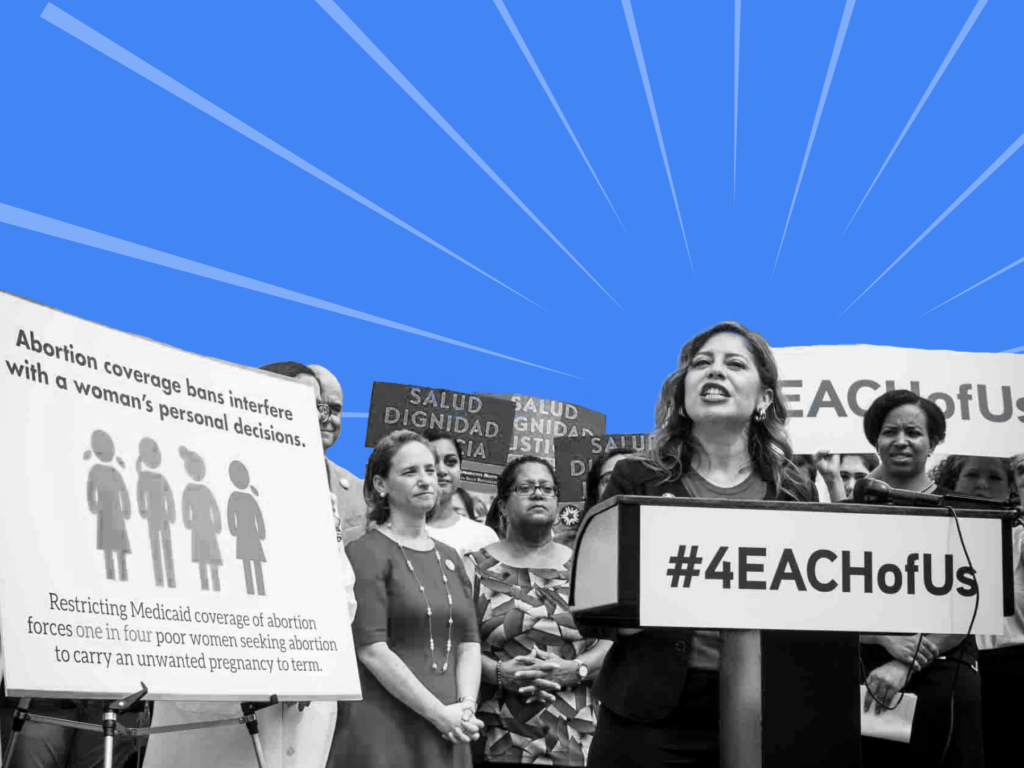As the midterms hurtle towards us, the MAGA threat to democracy looms larger. The results of these elections could determine whether the Right doubles down on their efforts to change voting and election rules. If unchecked, the Right could do irreparable harm to our increasingly fragile mechanisms of representative democracy.
Small-d democratic turnout for the elections will be critical. We especially need to energize the multiracial base of working-class voters that played the central role in defeating Trump in 2020.
The Supreme Court’s decision to overturn Roe v. Wade can help us do so. Dobbs v. Jackson Women’s Health Organization brings home the consequences of minority rule and rising authoritarianism. The Right, and much of the media, would have us “put Dobbs behind us.” We aren’t having it.
As a Left, we must craft a comprehensive and compelling narrative about democracy that includes strengthening the mechanisms of elections and extending democratic decision-making into our daily lives. A broad reproductive justice framework puts a key piece of that narrative in place. It gives us an opportunity to advance a vision of what support for reproductive health and families could look like in a caring economy—and to highlight the ways reproductive justice intertwines with fundamental democratic rights.
Majority support, minority rule
In the months since Dobbs, news from Kansas, Alaska and upstate New York suggests broad support for basic reproductive rights. When Kansas voters rejected a proposed amendment that would allow state legislators to outlaw abortion, we breathed a sigh of relief. A solid 59% of voters—including a significant number who backed Trump in 2020—rejected the initiative.
In NY-19’s special election, Pat Ryan, the Democrat who led with abortion rights and democracy issues, won handily in a very competitive district. Mary Peltola’s defeat of Sarah Palin in Alaska’s Aug. 31 special election to fill the state’s one US House seat sent another encouraging signal. Hopefully, this is further evidence that voters are motivated by candidates that speak to their concerns about the Dobbs decision.
Nationwide polls show that 61% of people surveyed support legal abortion, and 37% oppose it. Yet the 37% may prevail, because the Right deploys various mechanisms of minority rule to force its agenda and control political outcomes: voter suppression, gerrymandering, court-packing, etc. States with gerrymandered Republican majorities are the most likely to pass restrictions and possible bans against abortion. Gerrymandering is cementing conservative control over nearly half of the states. Wisconsin, for example, is so gerrymandered that 75% of congressional districts are Republican in a state where only 42% of voters lean Republican. But gerrymandering is not merely a partisan ploy: it often undermines the political power of voters of color. The Alabama redistricting case now before the US Supreme Court, Merrill v Milligan, could significantly curtail use of the Voting Rights Act.
This minority rule is not a bug, it’s a feature. “One person one vote” has only come close to reality in the US since the Civil Rights Act of 1965 (except during the roughly 15 years of Reconstruction). The Senate, which gives small rural states the same representation as larger states with urban areas, and the Electoral College, which encourages presidential candidates to work the electoral numbers instead of building a broad, democratic majority, benefit conservative and reactionary forces and disenfranchise voters of color. Five of the nine sitting Supreme Court justices were appointed by presidents who lost the popular vote.
Fugitive rights
As they seek to outlaw out-of-state abortions, lawmakers are trampling all over established legal precedents relating to interstate travel and commerce, individuals’ freedom of movement, and any notion of privacy. Following the lead set by Texas with SB8, more states are trying to empower private vigilantes to track and turn in someone for seeking abortion services in another state. Some proposals would force officials or medical staff in states without restrictions to file reports against women arriving from states with restrictions. This scenario brings to mind the pre-Civil War Fugitive Slave Law.
The Dobbs decision, and the conditions that made it possible, are eerily reminiscent of the Taney Court and its infamous Dred Scott decision in 1856, which included the declaration that persons of African descent, whether enslaved or free, could not be citizens of the United States. Then, as now, the interests of a powerful minority controlled the Courts and Congress. The court was packed—7 to 2—with pro-slavery judges. The Constitution’s compromises ensured the power of slaveholding states in controlling Congress and shaping federal policy. These included the Senate, the Electoral College, and the execrable Three-fifths Clause. The latter would eventually be nullified by the 13th, 14th, and 15thAmendments.
Towards a more inclusive vision of democracy
Our defense of reproductive rights is bound up with the need to reinforce and expand the mechanisms and vision of democracy.
Paying attention to and even fighting for the mechanisms of representative democracy will be salient in the midterms and beyond. These mechanisms include the ways districts are drawn, the rules governing elections and the way elections are administered. Many of them operate through state, local or hyperlocal offices, from secretaries of state through local election commissioners. Seven states have initiatives on the ballot that will dramatically affect how elections are conducted. Some, like Michigan’s Proposition 2, will expand voting access. Others, such as those in Arizona, Ohio and Louisiana, will impose new restrictions.
But to engage crisis-weary voters, we as the Left need to put forth a compelling vision about democracy: what it could look like, what conditions help nurture it, and why it matters. A reproductive justice lens offers one way to do that.
Self-determination is essential if individuals and communities are to be full participants in elections, in governance, and in civil society. Being able to make decisions about the most intimate aspects of our lives, our bodies, and our families is a fundamental precondition for democratic engagement. Denying the right to make such decisions excludes women and others who can get pregnant from full citizenship.
A more authentic democracy invokes a wider notion of freedom—that we each are free to be agents of change. It is hard to imagine this kind of freedom for yourself if you can be forced to give birth. Or if you are poor and cannot access a right that others take for granted—reproductive health services, including abortions. But erosion of the rights recognized by Roe began almost immediately. Congress passed the Hyde Amendment in 1976, which blocked the use of federal funds, including Medicaid, for abortions; 34 states have adopted similar restrictions.
Lack of access traps women of color in a vicious cycle, as SisterSong Executive Director Monica Simpson noted in an opinion piece in The New York Times. A majority of women insured by Medicaid are women of color, and lack of abortion access increases the chances that women will live in poverty. At the same time, maternal mortality is higher—sometimes dramatically so—for Black women.
The reproductive justice framework developed by women of color organizations like SisterSong speaks to these disparities in access. It encompasses everything that’s needed to get pregnant and give birth in a safe and healthy environment, and to secure the supports needed for raising healthy families. Abortion access is part of the picture; other pieces include maternal and child health care, day care, and the right to live free of violence.
Reproductive justice points to the vision we must be discussing, as a society that claims to care about families. How can we collectively provide the support that families need to thrive? It’s a vision we need to lift up to counter the open contempt the minority of right-wing leaders express for women’s health and the choices they must make. And it’s a vision we must realize to build the power we need to win multiracial democracy.
This editorial was prepared for Convergence by Sandra Hinson of our written content team and Marcy Rein of our editorial board.
Featured image: Executive Director of the National Latina Institute for Reproductive Health Jessica González-Rojas addressing a reproductive rights rally in Washington, DC, 2016. Photo courtesy of the National Latina Institute for Reproductive Health via Wikimedia Commons. Licensed CC BY 2.0.
Did you enjoy this article?
We're in the middle of our annual fund drive, and this year we're building our own internal infrastructure for subscriptions, meaning more of every dollar pledged goes to fulfilling our mission. Subscribe today to support our work and be a part of Convergence's next evolution.

